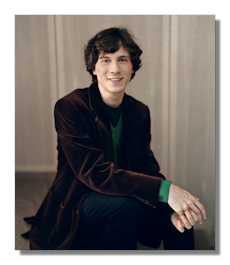
The Internet's Premier Classical Music Source
Related Links
- Latest Reviews
- More Reviews
-
By Composer
-
Collections
DVD & Blu-ray
Books
Concert Reviews
Articles/Interviews
Software
Audio
Search Amazon
Recommended Links
Site News
 Concert Review
Concert Review
Chopin on Speed

- Wolfgang Mozart: Piano Sonata #9 in D Major, KV 311
- Ludwig van Beethoven: Piano Sonata #8 in C minor "Pathétique", Op. 13
- Frédéric Chopin:
- Nocturne in A Flat Major, Op. 32 #2
- 2 Polonaises, Op. 40
- 3 Mazurkas, Op. 63
- Scherzo #3 in C Flat minor, Op. 39
Rafał Blechacz, piano
Brussels Center for Fine Arts 2 June 2014
The solo recitals of the Polish pianist Rafał Blechacz (now age 28) haven't changed much in content in the last four or five years. Not necessarily a bad thing, of course, as this could be a sign of continuous self-examination or a search for perfection. And yet a recent performance in Brussels of this year's Gilmore Artist Award recipient with a Mozart/Beethoven/Chopin program brought a fair amount of frustration. Blechacz's well-known energetic determination, his joy of making music, his blazing technique, as well as his charmingly old-style appearance (including long-tailed tuxedo), were still there to enjoy. But the evening was also marred by some ineffective attempts to channel his musical ideas. Overblown dynamic contrasts and rushed tempos (which have always been on the fast side anyhow, albeit never as relentless as now) could still pass, but more worrying was the lack of a distinctive sonority.
It worked well enough in the first half of the recital. In Mozart's D Major KV 311 Sonata, which already featured on Blechacz's second DG disc from six years ago, he convincingly dosed a sparkling, immaculate virtuosity with well-timed dramatic touches. Beethoven's "Pathétique" Sonata, too, sounded freshly minted, ready to conquer or baffle with its suspenseful urgency (did we ever hear such a threatening left hand?) and startling tempo changes. No pseudo-romantic lingering in the Adagio cantabile for Blechacz, but above all textural clarity and articulation.
Bizarrely, it was his Chopin after the interval which proved the most disappointing. Blechacz gave us Chopin on speed – hard-driven, loud, and insensitive. The brilliant colorist of two years ago had dipped his brush in a bath of steely grey which was applied to all the pieces. It sounded as if Blechacz couldn't get rid of the opening Nocturne Op. 32/2 fast enough. Loud but inexpressive, the rhythmical pulse was too rigid, and only got worse in the animated central 12/8 passage. So much for any romantic dreams you might still have had. The two Polonaises from the Op. 40 fared somewhat better. The A major, Op. 40/1, the famous "Military", was regimented and constantly loud. Blechacz ripped up the second with very outspoken contrasts in dynamics and tempos. Intensely dramatic, the dark basses felt outsized but the transition towards the main theme at the end was negotiated with a master's hand. The three Mazurkas from the Op. 63 set were played as in one breath with the softer and nostalgic moments (as in #3) struggling to be heard amidst the rhythmic brilliance. It was only in the turbulent world of the Scherzo #3 that Blechacz's prevailing mood found its most convincing expression. His grip on the structure was undeniable, resulting in a fascinating opposition of light and darkness. Not the most subtle rendition, but at least an exhilarating one.
Is this a new stage in Rafał Blechacz's development? Let's hope he was merely having an off-day.
Copyright © 2014, Marc Haegeman












